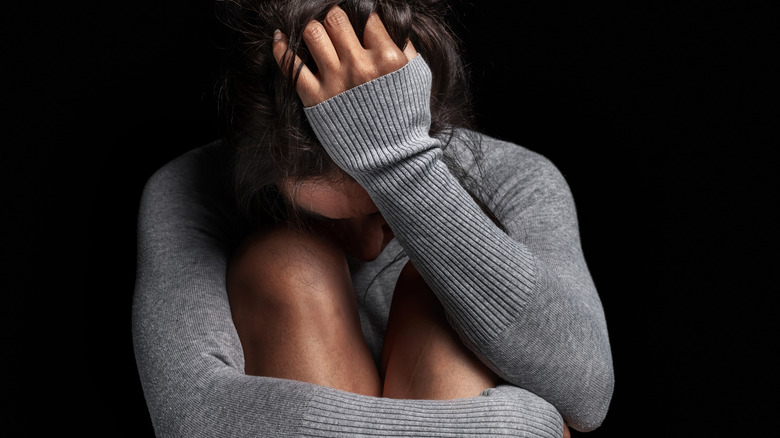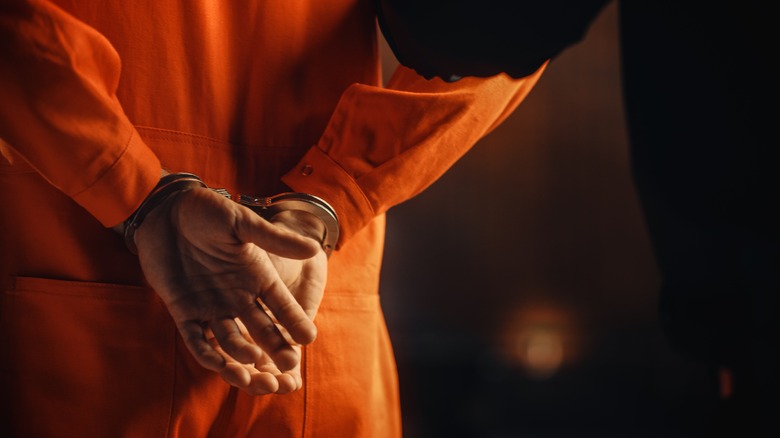Crime Analyst's Laura Richards Tells Us Why Coercive Control Needs To Be Legally Taken More Seriously
Despite the fact that the murder of Gabby Petito is considered solved, new evidence continues to come to light about steps that could have been taken to prevent her death. On November 3, Petito's parents filed a wrongful death lawsuit against the Moab Police Department in Utah, whose officers pulled the couple over one month before Petito was strangled to death by her then-boyfriend, Brian Laundrie (via Salt Lake Tribune).
According to the lawsuit, officers failed to recognize "basic signs of intimate partner violence." On August 12, 2021, Officers Daniel Robbins and Eric Pratt were following up on a 911 call; a witness had reported seeing a man "slapping" and "hitting" a girl, per People. But while the officers did speak with Petito and Laundrie, an independent review done by the City of Moab found neither officer tracked down the original 911 caller. The report also notes that while Laundrie admitted to assaulting Petito "first," neither the reviewer nor the responding officers felt the behavior didn't require further investigation.
Petito's parents believe that it's Pratt's own history — a bombshell detail disclosed in their lawsuit — with domestic abuse that blinded him to the signs of abuse. Unfortunately, studies show a potentially long history of domestic abuse among law enforcement. To get a better understanding of police culture and the other barriers stopping coercive control from being taken seriously, we turned to Laura Richards, a criminal behavioral analyst and creator/host of the podcasts "Crime Analyst" and "Real Crime Profile."
Attempts to criminalize coercive control in the United States have failed
When Maya Raghu told police her abuser was leaving flowers and gifts on her car while she was at work, they didn't see the harm in it (via The Cut). For law enforcement, these were seen as loving gestures but for Raghu, these "gifts" were a sign that her abuser had access to her whenever he wanted.
But according to Laura Richards — the former head of the Homicide Prevention Unit at New Scotland Yard and the founder of Paladin, the world's first National Stalking Advocacy Service — this is exactly the kind of abuse law enforcement doesn't take seriously (via Vox). "It's power games ... it's gaslighting, lies, blaming, cruelty, intimidation," professor Carmen Gill of the University of New Brunswick told The Globe and Mail. Gill adds that abusers will also isolate their victims from friends and family, behavior Richards told us in an email that, for her, is the biggest sign of coercive control and domestic abuse. Multiple studies in Australia and Canada have shown that these behaviors were precursors to femicide in almost all cases, per The Globe and Mail.
"By the time it turns physical it's too late for many," Richards explained to us in an email. "4-5 women are murdered every day [in the US] by current or former male partners. If they report to police, and many do, only physical behavior is deemed relevant in the eyes of the law."
Victims want coercive control laws
The abuse The Cut reports Maya Raghu experienced is actually illegal in a handful of countries, according to Time. But any attempts to pass similar laws in the United States have failed so far. According to the Battered Women's Justice Project, some fear coercive control laws could be used against victims while others don't believe there won't be enough room for the nuances of abusive relationships in the legal code.
Nuisance laws are already being used against victims, Ms. Magazine reports. One woman they talked to said after the fifth time she had to call police for protection against her abuser, police threatened to arrest her and her abuser, and put her children into protective custody with the state if she called 911 again. Poverty Law adds nuisance laws typically push victims either into homelessness or more dangerous situations.
"It's ironic that those who say they advocate for victims in the domestic violence sector are the ones that have been pushing back," behavior analyst Laura Richards first told us in an email. She recently repeated this statement in Episode 100 of "Crime Analyst," adding that these "advocates" are claiming Americans aren't ready to follow in the footsteps of the United Kingdom and Australia. "Victims say otherwise," Richards wrote to us. "The murder stats say otherwise."
Utah has a manual for how police officers should handle domestic violence
For criminal behavioral analyst Laura Richards, Gabby Petito's situation was handled not unlike the woman Ms. Magazine spoke with. In Episode 97 of "Crime Analyst," Richards reminds listeners that the initial 911 call was dispatched as a domestic, but the responding officers failed to treat it as such. If the call had been treated as an instance of domestic violence as originally dispatched, Richard explains that the officers should have followed Utah's "Domestic Violence 101" manual that lays out guidelines for police and prosecutors to follow.
The manual recognizes how frustrating it can be to go back to repeat 911 calls, as was the case with Ms. Magazine's story. Instead of threats of incarceration, though, the manual reminds officers and prosecutors that domestic violence is a crime and they have a duty to "meet the needs of the victim." This includes conducting "the kind of investigation that will allow prosecution to proceed without the victim's testimony." In other words, officers need to protect the victim.
Officers, the manual states, also need to not let themselves be manipulated by the real suspect. "The more alike a cop and suspect are," the manual warns, "the harder it is for the cop to believe the subject did what he did." A suspect trying to bond with officers over how "crazy" women are is one specific example the manual gives on behavior to be suspicious of.
The problem police culture and domestic violence
Unfortunately for Gabby Petito and countless other women, domestic violence is still an issue law enforcement doesn't consistently take seriously. Utah's "Domestic Violence 101" manual addresses the problematic culture directly, writing that law enforcement and prosecutors need to change their "attitude about domestic violence crimes."
This isn't just a Utah problem either; a 2015 report by the ACLU, CUNY School of Law, and University of Miami School of Law found that of the 900 people surveyed, 88% of respondents said "police sometimes or often do not believe or blame victims for the violence." The report added that "police inaction, hostility, and bias against survivors" were major barriers that keep victims from seeking help.
For Laura Richards, creator of the Domestic Abuse, Stalking and Honour Based Violence (DASH) Risk Assessment and Management Model, Officers Eric Pratt and Daniel Robbins put up these exact same barriers, preventing Petito from getting the protection she needed. In Episode 97 of "Crime Analyst," Richards brings up how in the independent review done by the City of Moab, Robbins was heavily influenced by his interactions with Brian Laundrie.
Robbins also noted in his report that Petito was "crying uncontrollably," "confused," and "emotional" — behavior he believed aligned with manic episodes. But as Richards points out "Crime Analyst," Petito's behaviors are consistent with the examples of victim behavior described in the "Domestic Violence 101" manual Pratt and Robbins should have been following.
Pathologizing domestic violence victims has lethal consequences
One of the major mistakes Officers Eric Pratt and Daniel Robbins made was pathologizing Gabby Petitio instead of listening to her. In Episode 97 of "Crime Analyst," behavior analyst Laura Richards highlights the fact that distress and other emotional states are normal reactions, especially in instances of coercive control.
"Across my career, I've seen that trauma is often pathologized when it's a woman," Richards explains on her podcast. "But distress and trauma are normal reactions to coercive control and abusers." She added that new studies have shown that post-traumatic stress — no matter if the root cause was a military deployment or abusive relationship — will cause a "generalized dysregulation of emotions" (via "Crime Analyst").
A victim of stalking — a form of coercive control — herself, Richards wrote in The Telegraph that she knows "firsthand the toll it takes — and how trusting and distressing it is that the onus is placed on you, the victim, to change your behavior." She added that it's the victim's credibility that's questioned, not the abuser's. To Vox, Richards adds that even the best-intentioned police officers lean on stereotypes and pathologizing rather than looking at the scenario before them objectively.
"We need to stop with the "emotional" woman, the "confused" woman, the "hysterical" woman, the "manic" woman — the sexist tropes," Richards adds on "Crime Analyst." Buying into these tropes, she warns, leads to victims being written off as "crazy" rather than being asked important, potentially life-saving questions.
Why policing the police is so hard
There's also the question of where intimate partners of law enforcement and other first responders are supposed to turn if their relationships become violent. A study published in August of this year found that men who were exposed to high-stress situations for prolonged periods and who also had "detached emotional states" were at high risk for perpetuating intimate partner violence. Burnout especially, the study showed, was a high-risk factor.
So when news broke in the Salt Lake Tribune about Officer Eric Pratt's alleged history with domestic violence, Laura Richards wasn't surprised. "Not a plot twist for me," she said on Instagram. His behavior witnessed in the body cam footage had major tells for Richards. The fact that he was so determined to make Gabby Petito the aggressor during his interaction with her and Brian Laundrie on August 12 is another reason Richards isn't surprised by these allegations.
But Richards also wasn't surprised about Pratt because of the current culture inside police departments across the United States she discusses in Episode 96 of "Crime Analyst." As The Atlantic pointed out in 2014, not only is domestic abuse perpetrated by law enforcement is underreported, but colleagues will give each other the benefit of the doubt in "borderline" cases. A New York Times article from 2013 adds that during their investigations, they found police departments had a zero-tolerance policy for marijuana — but domestic violence was ignored.
If you or someone you know is dealing with domestic abuse, you can call the National Domestic Violence Hotline at 1−800−799−7233. You can also find more information, resources, and support at their website.






